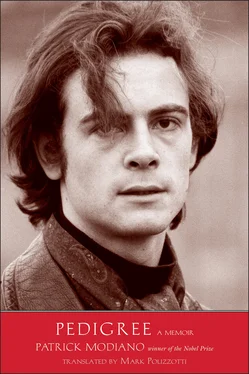And war broke out at a time when he had no capital whatsoever and was already living by his wits. In 1940, he had his mail sent to the Hôtel Victor-Emmanuel III at 24 Rue de Ponthieu. In a letter of that year to his brother Ralph, sent from Angoulême where he was stationed in an artillery regiment, he mentioned a chandelier that they’d pawned. In another letter, he asked to have the Courier des pétroles forwarded to him in Angoulême. In 1937–39, he was in “business” with a certain Enriquez, the Société Royalieu, dealing in Romanian petroleum.
The fall of France in June 1940 caught him in his barracks in Angoulême. He was not taken away in the mass of prisoners, as the Germans didn’t arrive in Angoulême until after the armistice was signed. He took refuge in Les Sables-d’Olonne, where he stayed until September. There he ran into his friend Henri Lagroua and two girls they knew, one called Suzanne and the other Gysèle Hollerich, a dancer at the Tabarin.
Back in Paris, he did not register with the authorities as a Jew. He lived with his brother Ralph, at the home of Ralph’s girlfriend, a Mauritian with a British passport. The apartment was at 5 Rue des Saussaies, right next to the Gestapo. Because of her British passport, the Mauritian had to appear at police headquarters every week; she would be detained for several months in Besançon and Vittel as an “Englishwoman.” My father had a girlfriend, Hela H., a German Jew who had been engaged to Billy Wilder back in Berlin. They were picked up during a raid one evening in February 1942, in a restaurant on Rue de Marignan, during an identity check — which were frequent that month because of the new regulations forbidding Jews from being out on the street or in public after 8 P.M. My father and his girlfriend were not carrying any papers. They were carted off in a Black Maria by police inspectors, who brought them to Rue Greffulhe for “verification,” before a certain Superintendent Schweblin. My father had to state his identity. He got separated from his girlfriend and managed to escape as they were about to transfer him to the “Depot,” the holding tank, taking advantage of a moment when the hall light went out. Hela H. would be released from the Depot the next day, probably on a word from a friend of her father’s. Who? I’ve often wondered. After his escape, my father hid under the staircase of a building on Rue des Mathurins, trying not to attract the notice of the concierge. He spent the night there because of the curfew. In the morning, he went home to 5 Rue des Saussaies. Then he hid out with the Mauritian and his brother Ralph in a hotel, the Alcyon de Breteuil, whose manageress was the mother of a friend of theirs. Later, he lived with Hela H. in a furnished room on Square Villaret-de-Joyeuse and at the Marronniers on Rue de Chazelles.
Among the people he knew at the time, the ones I’ve managed to identify are Henri Lagroua; Sacha Gordine; Freddie McEvoy, an Australian bobsled champion and racing driver with whom he shared an “office” on the Champs-Elysées right after the war (I’ve never been able to determine the name of the company); a certain Jean Koporindé, 189 Rue de la Pompe; Geza Pellmont; Toddie Werner (who called herself “Mme Sahuque”) and her friend Hessien (Liselotte); and a Russian girl, Kissa Kuprin, daughter of the writer Aleksandr Kuprin. She had acted in a few films and in one of Roger Vitrac’s plays, Les Demoiselles du large. Flory Francken, aka Nardus, whom my father called Flo, was the daughter of a Dutch painter. She had spent her childhood and adolescence in Tunisia, then had come to Paris and hung out in Montparnasse. In 1938, she’d been implicated in a minor incident that had landed her in criminal court, and in 1940 she had married the Japanese actor Sessue Hayakawa. During the Occupation, she was close to the actress Dita Parlo, who had starred in L’Atalante , and her lover Dr. Fuchs, one of the directors of the so-called Otto Bureau, the most important of the black market “purchasing services,” located at 6 Rue Adolphe-Yvon in the 16th arrondissement.
This was more or less the world in which my father circulated. Demimonde? Underworld? Before she is lost in the cold night of oblivion, I’ll mention another Russian, who was his girlfriend at the time: Galina “Gay” Orloff. She had immigrated to the United States when very young. At twenty, she was dancing in a burlesque club in Florida, where she met a small, dark man, very sentimental and courteous, whose mistress she became: a certain Lucky Luciano. Back in Paris, she had worked as a model and married to obtain French citizenship. At the start of the Occupation, she lived with a Chilean “secretary of legation,” Pedro Eyzaguirre, then on her own at the Hôtel Chateaubriand on Rue du Cirque, where my father often went to see her. A few months after I was born she gave me a teddy bear that I long held onto as a talisman and my only souvenir of an absent mother. She took her life on February 12, 1948, at age thirty-four. She is buried in Sainte-Geneviève-des-Bois.
The more I draw up this list of names and call the roll in an empty garrison, the more my head spins and my breath grows short. Curious individuals. Curious times, neither fish nor fowl. And my parents came to know each other during that period, among those people who were like them. Two lost, heedless butterflies in the midst of an indifferent city. Die Stadt ohne Blick. But there’s nothing I can do about it: that’s the soil — or the dung — from which I emerged. Most of the scraps of their lives that I’ve been able to gather, I get from my mother. But there was much she didn’t know about the murky, clandestine world of the black market in which my father traveled by force of circumstance. She was unaware of most of it. And he took his secrets to the grave.
They met one evening in October 1942, at the home of Toddie Werner, aka Mme Sahuque, at 28 Rue Scheffer, 16th arrondissement. My father was carrying an identity card in the name of his friend Henri Lagroua. On the glass door of the concierge’s lodge at 15 Quai de Conti, the name “Henri Lagroua” had been listed among the tenants since the Occupation, next to the words “fourth floor.” When I was a child, I asked the concierge who this “Henri Lagroua” was. He answered, “Your father.” This dual identity had impressed me at the time. Much later, I learned that during that period he’d used other names by which certain people still knew him well after the war. But names end up becoming detached from the poor mortals who bore them and they glimmer in our imaginations like distant stars. My mother introduced my father to Jean de B. and her friends. They thought there was something “weird and South American” about him and gently cautioned my mother to “be careful.” She repeated this to my father, who joked that the next time he would “look even weirder” and “scare them even worse.”
He was not South American, but having no legal existence, he lived off the black market. My mother would pick him up at one of the tiny offices reached via the multitude of elevators along the arcades of the Lido. He was always there with several others whose names I don’t know. He was mainly in touch with a “purchasing service” at 53 Avenue Hoche, the office of two Armenian brothers he’d known before the war: Alexandre and Ivan S. Among the goods he delivered to them were entire truckloads of old ball bearings lifted from expired stock of the SKF company, which would sit uselessly in a warehouse in Saint-Ouen, gathering rust. In the course of my research, I came across the names of a few individuals who worked at 53 Avenue Hoche — Baron Wolff, Dante Vannuchi, Doctor Patt, “Alberto”—and wondered whether these weren’t just more of my father’s pseudonyms. It was in this purchasing service on Avenue Hoche that he met a certain André Gabison, the manager of the establishment, whom he often mentioned to my mother. I once got hold of a list of German Special Forces agents dating from 1945, which contained a note about this man: Gabison, André. Italian national, born 1907. Merchant. Passport no. 13755, issued in Paris on 11/18/42, listing him as a Tunisian businessman. Since 1940, associate of Richir (purchasing service, 53 Avenue Hoche). In 1942, in St. Sebastian as Richir’s contact. In April 1944, worked under the command of a certain Rados of the SD; traveled frequently between Hendaye and Paris. In August 1944, reported as belonging to the sixth section of the Madrid SD under the command of Martin Maywald. Address: Calle Jorge Juan 17, Madrid (tel.: 50-222).
Читать дальше












